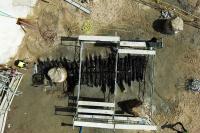In the heart-stopping realm where precision meets spectacle, a Spanish F/A-18 Hornet recently etched a moment of breathtaking audacity into the annals of aviation history. During a beach airshow that was supposed to showcase aerial mastery, the fighter jet found itself dancing perilously close to the surf’s edge, transforming a routine exhibition into a heart-racing display of skill and nerve. This incident, now documented and analyzed, offers a vivid glimpse into the razor-thin margins that separate controlled flight from potential catastrophe, reminding spectators and aviation enthusiasts alike of the razor’s edge on which military pilots operate. Spectators at a recent airshow along the Spanish coastline were left breathless as a Spanish Air Force F/A-18 Hornet performed a heart-stopping maneuver that seemed to defy the laws of physics and gravity. The high-intensity display pushed the boundaries of aerial performance, bringing the powerful fighter jet perilously close to the water’s surface in a breathtaking display of precision flying.
Witnesses reported that the aircraft descended to an incredibly low altitude, with its wingtips seemingly mere meters from the crashing waves.The pilot’s exceptional skill was on full display as the multi-role fighter jet skimmed just above the surf, creating a dramatic visual spectacle that had onlookers holding their collective breath.
Professional aviation photographers captured the moment, with multiple angles revealing the jet’s amazing proximity to the water. The F/A-18’s distinctive silhouette cut a dramatic path against the blue Mediterranean backdrop, demonstrating the remarkable capabilities of both the aircraft and its pilot.
Military aviation experts have since analyzed the footage, noting the extreme precision required to execute such a maneuver safely. The Spanish Air Force is renowned for its skilled pilots and rigorous training programs, which clearly manifest in such dramatic aerial displays.
The incident highlights the incredible technological and human capabilities of modern military aviation.The F/A-18 Hornet, a versatile fighter jet used by multiple nations worldwide, showcased its impressive maneuverability and the exceptional skills of its pilot during the airshow.
Social media platforms were quickly flooded with images and video clips of the near-surf encounter, with aviation enthusiasts and casual observers alike sharing their amazement. The viral nature of the event underscored the public’s continued fascination with high-performance military aircraft and aerial demonstrations.
While such displays are carefully planned and executed with stringent safety protocols, they never fail to generate excitement and admiration.The combination of cutting-edge technology, human skill, and raw power creates a spectacle that continues to captivate audiences around the world.
The Spanish Air Force has not officially commented on the specific details of the maneuver,maintaining its typical professional stance regarding operational demonstrations. However, the incident serves as a powerful reminder of the incredible capabilities of modern military aviation and the exceptional training of its pilots.
For aviation enthusiasts and casual observers alike, such moments represent the pinnacle of aerial performance, showcasing the extraordinary intersection of human skill, technological innovation, and sheer mechanical power.





